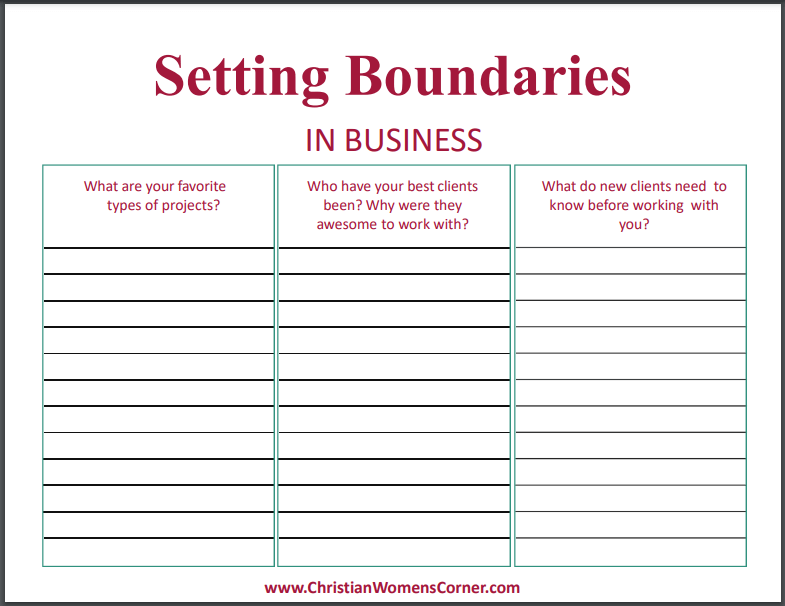- Welcome
- Setting Boundaries In Business
Setting Boundaries in Business
Valerie was a virtual assistant to authors and business coaches. When she first started, she enjoyed her online business. But over the years, she’d lost her love for it and often felt like she was simply working for that next dollar.
One night, a client sent a text message to Valerie to say he had a large project he needed to be done within twenty-four hours. Valerie’s husband got angry when she interrupted their date night to get on the computer and start working on the large project.
Like many Christian entrepreneurs, Valerie was struggling with setting boundaries in her business. This affected many areas of her life, including her marriage, her relationship with her children, her faith walk, and her health and wellness.
If you’ve never heard of the concept of boundaries, you might struggle to understand what it is. Fortunately, Sharon Martin has an excellent definition of boundaries.
She says, “A boundary is an imaginary line that separates me from you. They separate your physical space, feelings, needs, and responsibilities from others. Your boundaries also tell other people how they can treat you – what’s acceptable and what isn’t.”

We have printable worksheets available to help you set boundaries in your business. They include guided questions that will trigger thoughts and ideas to help you create a well thought out plan. Click >>here<< for the worksheets.
Why Boundaries Are a Good Thing
Boundaries can be a confusing topic for many Christians, and when it comes to business, the discussion turns even murkier. After all, you want to be a good witness for Christ and show the world His love.
But you can be loving and still set limits. God is loving, and because He is loving, He set limits with Adam and Eve. He gave clear instructions not to eat from the tree of knowledge (Genesis 2:16-17). When they violated God’s boundaries, Adam and Eve experienced the consequences of their actions.
God set the boundary with the tree specifically because He knew the pain that would come to Adam, Eve, and even Himself—if they sinned.
It’s the same concept in your personal life and your business. You set boundaries to avoid pain for yourself, your clients, and your family. This makes setting boundaries an act of love. Let’s examine how and why boundaries allow you to love…
You Show Up Happy & Healthy
One of the reasons Valerie lost her love for her business is that she had poor boundaries. She always jumped online the moment a client needed her, and this meant that she rarely took the time she needed to unplug and recharge.
When you have boundaries that separate your business from your personal life, you can show up in every area happy and healthy.
You Can Serve More Effectively
Whether you’re helping your daughter with her homework, cooking dinner for a sick spouse, or coding a website for your client, you serve most effectively when you have boundaries in place. This is because you can see clearly when something is your responsibility and when the other person needs to step up and do their part.
Remember that while God set a boundary for Adam and Eve, He never made the choice for them. He set His limit and then allowed them to make their own choices (and deal with the resulting fallout).
You Tackle Problems More Efficiently
The more focused you are on setting boundaries and keeping them, the more it alters how you look at problems. You can take responsibility for the issues you’ve caused and bring up solutions to fix the mess.
For example, you’ve been putting up with a client that calls you late in the evening to request changes in the work you’ve been doing. If you’ve set poor boundaries, you can take responsibility for the problem. Then you can take responsibility for creating a solution, such as setting a regularly scheduled meeting once a week to talk with this client about the project.
Setting boundaries can be a beautiful thing. But if you’re new to boundaries, they might seem scary or mean at first. Just remember that God sets boundaries with His children, and He’s the perfect example of love!
Where Do You Need to Set Boundaries?
Luke’s heart sank when he got the email. The client was asking for yet another change to the project. When he’d originally taken on the job months ago, the project sounded simple and straightforward.
But as time went on, the client kept asking for one more thing. Meanwhile, Luke was still waiting to send the invoice until the job was officially finished.
Luke was experiencing something many veteran service providers recognize as “scope creep.” It’s when the terms of the project change over time.
Often, this is from a client who asks for “one small tweak” or “this little change,” thinking it’ll only take you an extra two minutes to do the task. In truth, it might add hours or even days of extra work to your plate.
Scope creep is a perfect example of poor boundaries in business. But it’s certainly not the only time that your boundaries can be pushed. Here are a few other examples…
Abusive Treatment from Clients
Amy sighed and held the phone away from her ear as her client, Jim, screamed about how she’d broken his website. In actuality, he’d once again been hacked because of his poor security choices. No matter what Amy told him, the man was determined to ignore her advice and warnings about his outdated software. Then he’d get hacked every few months and blame her.
Amy accepted the rants because she figured he was a paying client, and she needed the money. It never occurred to her that she reinforced his bad behavior every time she accepted this treatment.
The Check Is in the Mail
Neal had a client that he liked working for. In many ways, this client was the ideal one. He always gave Neal plenty of time to work on new projects, never changed the scope, and rarely asked for revisions.
There was just one tiny problem. Neal always had to send multiple reminders and follow up six or seven times when he wanted an invoice paid. Neal’s client always had an excuse for why he couldn’t pay at that exact moment. Eventually, Neal would get the money, but he’d spent countless hours following up by that point.
Drop Everything Denise
Kay had a client, Denise, that was a busy entrepreneur. She liked the other woman’s energy, but Denise had a habit of calling up Kay at the last minute for one more “emergency” project. Her poor planning and inability to be organized would somehow become Kay’s problem.
At least once a month, Kay would find herself pulling all-nighters to get something done for Denise. It got so bad that Kay’s husband started jokingly calling her client “Drop Everything Denise.”
Boundary Pushers Are Everywhere
Boundary pushers are clients and customers that push at your boundaries. Most of them aren’t bad people. In fact, they may be so oblivious; they don’t know what they’re doing and certainly don’t mean any harm.
However, it’s your job to set boundaries. As a Christian entrepreneur, not setting boundaries is failing to show love. You must acknowledge this truth before you proceed.
Make a List
Sit down and make a list of the ways your boundaries have been or are being violated. This isn’t about blaming anyone or even fixing anything right now. You’re simply taking the time to observe how your boundaries have been trampled.
If you’re not sure if your boundaries were pushed, think back to situations where you were tempted to be resentful or felt angry while doing your work. Chances are, your boundaries were squashed in those situations.
Setting Smart Business Boundaries
Now that you’ve been learning about boundaries and all of their amazing benefits, you might be wondering how to go about setting up some of your own. Here’s what you should know…
Create Your Own Vision
The good news is that there’s no right or wrong when it comes to setting boundaries. If you decide you don’t want to work weekends, that’s fine. If you decide you only want to work Sunday-Wednesday, that’s fine, too.
You don’t have to live out anyone else’s vision for your business. As long as you’re doing your best to honor God and love others, you can shape your ideal business schedule any way that you want to.
Design an Onboarding Document
The onboarding document should contain all of the information your clients might need to know about your business, like your work hours and how to reach you.
Depending on the type of services you do, you might want to specify how clients can contact you in an emergency and what qualifies as one.
For example, you’re a web designer. You might state that a hacked website qualifies as an emergency and that clients can reach out to you on Skype. But you may state that “my font looks wonky” is not an emergency and should be addressed over email.
Some freelancers also spell out when they’re on vacation and which holidays they take off from work. For example, you might say, “I live within the US and observe all major US holidays, including Christmas, Easter, Labor Day, etc.”
Remember that it’s not cruel when it comes to setting boundaries. It’s an act of love. Clients appreciate knowing how and when to contact you. They like that you’ve simplified the process of reaching out.
Have a Contract
Some clients may balk at signing a contract to work with you. Generally, these clients have either been burned in the past by a lousy freelancer, or they’re planning on skipping out without paying the tab. Both situations can cause you untold hours of frustration.
In your contract, declare what the project is and what the scope is. For example, a writer might say, “(Client Company) is hiring (writer’s name) to create five articles for their new content marketing campaign, Learn to Create a Mailing List. Each article will be 1,500 words and delivered by (due date).”
A clear, direct statement makes it obvious when the work has been fulfilled. If a client asks you to do something extra, like create videos to go with the articles, you can simply say, “I’m sorry. That’s outside the scope of the contract.”
Or, if you want to do the work, you can simply say, “That sounds like fun. Let’s tackle it after we’ve completed this project.”
Set Up Consequences
Consequences are meant to stop bad behavior before it starts. This is why many freelancers charge a late fee for invoices that aren’t paid promptly. Many clients want to avoid this fee, so they pay the invoice on time.
But the critical thing to remember about consequences is that they must be enforced to be useful. It does no good to say you’ll charge a late fee then always let one of your clients get out of paying you on time.
That said, there might be unique situations where you grant grace to a client on a case-by-case basis. Maybe you have a client who’s always paid your invoices as soon as you sent them, but her husband was recently diagnosed with a serious illness. You may choose to extend the timeline for her payments.
However, if a client always has an excuse, rest assured that’s just what they are – excuses. You need to hold firm to your boundaries in these situations.
When you’re first learning to set boundaries, it can be exhausting. But the more you do it and let it become a standard part of your business, the easier it becomes!
How to Screen Potential Clients
You’re getting better at setting boundaries. But you’ve noticed that you’re still attracting clients who aren’t a good fit or, worse, they’re disrespectful of your time and talents. You might despair of ever finding good clients.
The real problem here is that you’re ignoring red flags early on in the relationship. Some Christian entrepreneurs do this because they don’t have enough experience working with clients, while others believe things will improve with time, yet that’s rarely the case. Here’s what you should be watching for the next time a potential client appears…
How They Talk about Previous Freelancers
Ask a potential client if they’ve worked with other previous freelancers. If they answer yes, ask them about the experience and what they did or didn’t like. Then listen very carefully.
Imagine a potential client rails on a previous freelancer and tells you, “He was the dumbest guy I’d ever met. I should never have trusted him with my website security.”
It’s only a matter of time before you’re the next “dumbest guy” he ever hired. Instead, look for a client who says something polite like, ‘We weren’t a good fit.” Or “His vision was different from mine.”
Look for Certain Phrases
Certain phrases immediately warn off veteran service providers. When they hear these phrases, they know to avoid the client entirely. Some of these include...
- I'll know what I want when I see it. This means you’ll spend a lot of time guessing what the client wants.
- This should be easy. Translation: I don’t value what you do.
- We have plenty of work further down the line. This means, “give me a cheap quote on this first project, please.”
- I can give you lots of exposure. Translation: I don’t pay well.
Read Reviews
If your potential client is a business, you might benefit from reading reviews about their company. Try looking at their Facebook reviews, Glass Door reviews, and Google reviews. If customers and employees complain about a culture where bullying and harassment are common, you’ll know to steer away from the place.
Listen to the Spirit
Sometimes, you’ll simply get an impression about a potential client. This might be the Spirit leading you to work with someone or pass on the possible project. Always take a few minutes to check in with God and pray over new business adventures. Ask Him to guide you and give you wisdom!
Enforcing Your Boundaries
As you begin creating boundaries, expect some pushback. Clients and customers who aren’t used to your new limits may struggle with them at first. Here’s how you can enforce your boundaries while still being kind…
Realize It May Not Be Intentional
Sometimes, a client tramples your boundaries without meaning to. For example, you have an international client halfway around the world. They email you with a new project over the weekend. They may not realize their Monday is still your Sunday.
But you still don’t have to drop everything. Instead, you can sweetly remind them by saying, “Hey, this sounds like a fun project. I can’t wait to get started on Monday!”
Acknowledge Patterns
So, there are accidental boundary-pushers like the international client above. But some boundary-pushers do it habitually, almost as if they’re testing you to see what they can get away with.
In these situations, you need to address the issue. You might say, “I understand you have many urgent projects. I’ve recently updated my policies, effective on (date). Projects assigned with a 48-hour turnaround will now be eligible for a rush fee or billed at a higher rate. To avoid these additional expenses, please provide project details and all needed materials at least 3-business days in advance.”
Fire the Horrific Clients
You have one client whose emails tie your stomach up in knots. Every time you see their name in your inbox, you worry. You’re always getting blamed for things you didn’t do or belittled for your latest project.
But you don’t have to tolerate this behavior. Christ calls us to love others as ourselves. That means He expects us to love ourselves. There’s nothing wrong with leaving a situation that’s demeaning or stressful. You can better shine Christ’s love when you’re not constantly stressed out by bad clients.
Firing a client isn’t all that difficult. You can send an email or have a phone conversation. Simply state, “Effective on (date), our working relationship will be terminated. In the meantime, I will be completing projects A, B, and C.”
Avoid blaming the client or getting into arguments about whose fault it is. If you’re pressed for an answer on why you’re walking away, you can say something noncommittal, such as you’re going in a new direction or needing more time to pursue a passion project.
Don’t Violate Your Own Boundaries
You said in your onboarding documents that you work from 10 am – 2 pm Monday through Friday. That’s awesome. But when the clock strikes 2 pm, you need to physically leave your desk.
If you violate your own boundaries, you’ll send a message to yourself. The message will be loud and clear that it’s OK if boundaries are ignored. Pretty soon, you’ll begin accepting this behavior from clients, too.
Boundaries Are a Blessing
Boundaries are a huge blessing. They gift you with the time and energy you need to be an effective witness for Christ. They bless your clients by giving them clear guidelines on how to treat you, and they bless your family by showing them that they’re more important than anything on your screen!
Don’t be afraid to stand up, establish firm boundaries, and stick to them. Remember that setting boundaries is an act of love!
Grace and peace,
Alicia
Free Downloads
Whew! You made it to the bottom of this blog post. I appreciate you taking the time out of your busy day to read what was on my heart. I'd like to thank you by offering two free PDF downloads when you fill out the form below.
Make sure to click the box beside 'Subscribe to the CWC Email Community' to receive our monthly newsletter and a few emails a month to keep you informed about our community, updates on the website, and to send you cool free stuff!

The first is a workbook that goes deeper into setting boundaries in business. It includes guided questions and places for notes.
The second is a checklist that contains tips, ideas and suggestions about setting boundaries in your own business.
You can read the PDF downloads on whatever electronic device you use and fill out the workbook answers in your own notebook.
Another way to enjoy the downloads is to print them out on your home printer or email them to your favorite printer like the UPS Store, Staples Business Depot, or Kinkos and use them in printed form.
Your information is 100% private & never shared.
- Welcome
- Setting Boundaries In Business








